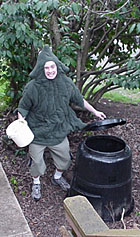Composting

Turn food scraps and yard trimmings into soil-building compost
Audits of college and university waste streams show that significant quantities of organic residuals are generated by food service and grounds maintenance activities. The following websites show some of the ways colleges and universities are recovering their organic residuals.
INFORM: Getting an A at Lunch
WHAT’S HOT: An overview with practical strategies to reduce food and dining wastes
This is a guide for reducing food and food-related waste by campus food service operations that was published by Inform in 1998 and is available as a downloadable PDF document. The food waste prevention strategies discuss preparation waste, unserved food and plate waste. Food-related wastes that are addressed include disposable cups, paper products and packaging.
University of North Carolina at Chapel Hill – Food Waste Recycling
WHAT’S HOT: Virtual tour from food waste collection to compost production
UNC – Chapel Hill’s food recycling program being conducted at Lenoir Dining Hall is presented in the form of a PDF-based visual tour that shows how food waste is separated, collected and then composted. This includes a summary of the program results for 2001 for recyclable and organic materials.
Middlebury College – Food Composting Program
WHAT’S HOT: Small campus success stories
Middlebury College’s program for composting food waste from its dining and other major food service areas is described in an on-line report. This report covers a brief history of the program, what materials are composted, the college’s experiences with its composting system and the benefits that have been achieved.
Medical University of South Carolina (MUSC) – Vermicomposting
WHAT’S HOT: Worms are awesome!
This site describes the vermicomposting system being used by MUSC. There are also a set of instructions on how to make a small worm composting bin and a downloadable primer on vermicomposting.
Washington State University – Compost Facility
WHAT’S HOT: Pesticides threaten composting programs
This site provides a comprehensive overview of a 4-acre composting facility that has been operated by Washington State University since 1994. An important recent addition to this site is a series of articles on the impact of persistent herbicides, particularly clopyralid, on finished compost quality. This site includes information about the facility’s history, operating procedures, finished products and economics. Materials processed through this facility include residues from animal sciences and veterinary activities, coal ash, food and green wastes.
University of Vermont – Food Waste Composting
The University of Vermont has a system set up for recovering food waste from student resident halls that is described by this web page. This includes photos of the collection bags and containers that are used and a link to the facility that composts the recovered food waste.
